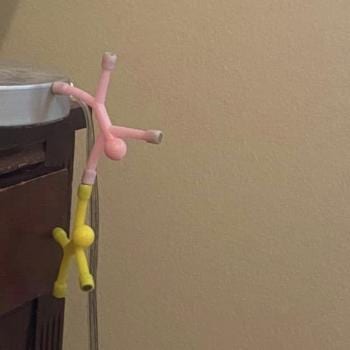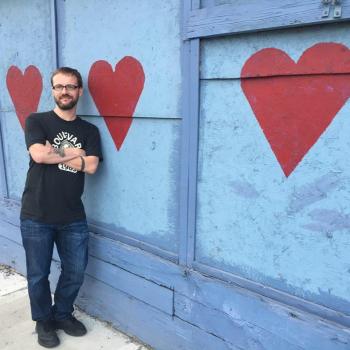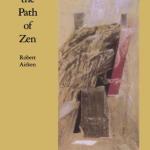“If we attach importance to someone we will feel greater concern for the person and, as a result, we will also show greater interest in his or her well being.”
-Thupten Jinpa
Caring about other people makes us feel connected. This is all the more true if we believe other people are important. And it’s still even more true if we believe other people are *gasp* as important as we are. I’m not telling you anything that you don’t know. So we should learn how to care about other people. If we cultivate kindness and compassion then we won’t feel so disconnected from the world around us. Connection is where the magic is.
It starts with paying attention to people. In ‘A Fearless Heart’ the former monk and professor Thupten Jinpa says, “Paying attention is an indispensable link in the experience – and ultimately action – of caring for someone.” People can tell when you’re really paying attention and they love it. The people you interact with can tell if you really care.
In his book ‘How to Win Friends and Influence People’ Dale Carnegie lists a bunch of things we can do that to improve our relationships. And almost everything he suggests falls into the category of showing other people that you care about them. He says, for example, “Give honest, sincere, appreciation”, “Become genuinely interested in other people,” and, “Remember a person’s name.” I really like that last one but also I’m not good at remembering a lot of names, so I have to work at it. It may seem silly, but I can tell when someone says “Hi Daniel,” and I repeat their name back when I say hello. They may not even always know it means something to them, but it does.
That’s not to say it’s easy. The truth is that it’s hard to care about other people sometimes. Our hearts can be closed instead of open because we’ve all been kicked in the heart many times, so we’re afraid to be vulnerable. But our capacity for compassion is really stunted without vulnerability. It’s through vulnerability that we learn empathy and compassion. Vulnerability makes us able to relate to the suffering of others and to really care. When someone loses a loved one, we can be sorry for their loss or we can just say the words, “I’m sorry for your loss,” with no real feeling behind it. This is common. We go through the motions of saying things like that because we are supposed to.
Jinpa says, “A heart that is hardened cannot be touched. A closed heart cannot receive the blessings that come it’s way. Our heart closes because we have felt burned and we’re afraid of being burned again. We think we have been let down or taken advantage of by others too often, so we put up our guard. We think open hearts are for chumps,” and he goes on to say, “Vulnerability is our gift; it equips us to understand others; it makes it possible for us to get out of ourselves and into someone else’s skin. The more we learn to be with our suffering the more we will be able to connect with other people.”
We sometimes think vulnerability is a weakness and it’s not. Vulnerability is a powerful tool for us to use in our personal development. It’s a strength. Vulnerability is where connection comes from and an open heart is really the thing that helps us conquer things that often get in our way like jealousy and resentment.
There are several things we can do in order to open our hearts. I can recommend some great meditation techniques for this. Metta Meditation, Tonglen Meditation, Chenrezig Practice, these are great spiritual practices that help us develop compassion and I’ll put some links in here for those. Metta involves focusing your mind on warm hearted feelings toward others and also yourself. Tonglen involves visualizing yourself taking the suffering of the world into your body and purifying it. Chenrezig Practice involves trying to awaken Bodhichitta, an open heart that’s at the center of our being. All of these practices are great and I’ve had success at opening my heart with them.
But I want to write about some more basic and simple things we can do.
Showing kindness is one. Even when we don’t feel like being kind, we can still do it. Sometimes people say “fake it til you make it,” and I think that sort of applies. That isn’t to say we should be doing something nice for someone and in the back of our minds be thinking they’re a jerk. But every opportunity for kindness is an opportunity to open and warm our hearts.
And the other side of this is learning how to really appreciate it when someone else shows kindness to us, to really focus on it instead of just moving on to the next thing. Far too often we just move on to the next thing. Every act of kindness matters, even the really small ones like remembering someone’s name.
And there’s also gratitude. It can be hard to remember to be grateful when the good things happen. Jinpa says that gratitude, “puts us in a more positive frame of mind. When our perspectives are tempered by gratitude, we appreciate our good fortune; we treasure what we have rather than bemoan what we don’t have, and this tends to make us more optimistic about the future too.”
Gratitude, like vulnerability, is a strength. When you’re grateful for the little joys in life, then you’re happier. I think we all know that. We’ve all heard that message many times, but at the same time it’s not always something that’s easy to embody.
I’ve had to do a lot of expensive things for the upkeep of my house since I’ve bought it, but I can still cultivate appreciation that I have the opportunity to own a house. It’s definitely an opportunity many people wish they had. And I didn’t like renting an apartment before this. But sometimes when there’s an expense and I catch myself being unreasonably annoyed. Lots of homeowners may have stories about this. But I can remind myself, at least I have a house. It’s a privilege many people don’t have.
I’m going to close with one more quote from Thupten Jinpa that I think really exemplifies and sums up all of this. Here it is:
“In the face of suffering, we can give up and wallow in (self-) pity and despair. Or we can close up and harden our hearts. Alternatively we could choose to be with our predicament and emerge from our experience a little wiser, a little more patient, and a little kinder. Compassion practice helps us choose this wiser course in our engagement with the very human condition of suffering.”
Here are some guided meditations:
Meditation for Kindness (metta) with me
Tonglen Meditation with Ethan Nichtern
Chenrezig Practice with Lama Lena
==============================================================
If you’re here in Kansas City, I have a free public event coming up. Details are here:
2/26/22 2pm @Aquarius KC
Talk: Boundless Heart Meditation
=====================================
AND if you want to help us build a new Buddhist temple in Kansas City, you can click here:
Rime Center Temple Project
The Rime Buddhist Center wants to be a positive force in the community. A sacred place that is full of learning, reflection and joy. We want to be a spiritual home to a vibrant sangha – your spiritual home. We invite you to participate in a truly unique project – building the first Tibetan Buddhist Temple here in Kansas City. Support us as we open the doors of loving-kindness and achieving peace through compassion.
==========================================
If you want to get Thupten Jinpa’s book, which I really recommend you can do so here:
A Fearless Heart: How the Courage to be Compassionate Can Transform Our Lives













